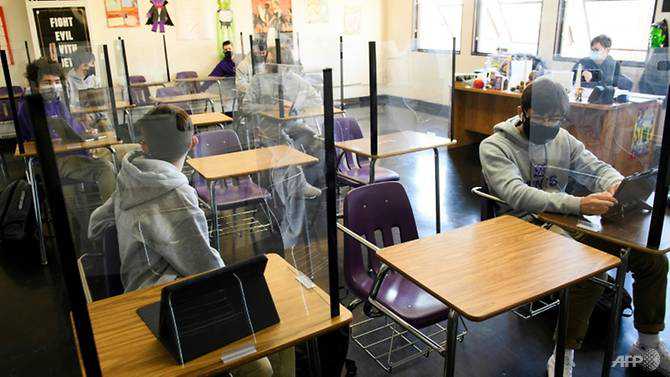As COVID-19 rages globally, US place to vaccinate low-risk teens
05 May, 2021

President Joe Biden desires 70 per cent of American adults to have received at least a single shot of a COVID-19 vaccine by the Jul 4 getaway, and has made vaccinating adolescents an integral portion of the next stage of the country's immunisation plan.
But targeting US teens is a good controversial maneuver among many experts, who argue it is a serious mistake to utilize the world's limited way to obtain doses on a good low-risk population as the pandemic surges found in countries like India and Brazil.
Pfizer and its own partner BioNTech said found in March their two-dose program was displayed to be safe and sound and impressive in a good trial of 2,260 12-to-15-year-olds.
An emergency use authorisation is expected in the coming days, and Biden told White House reporters on Tuesday that "if that announcement comes, we are ready to move immediately".
The president's address comes as the nation's immunisation campaign is stalling after hitting a peak in early April.
More than 56 % of adults have received a number of shots, but as the price of uptake falls, officials are devising new methods to reach vaccine hold-outs.
These includes discounts to shoppers who get vaccinated at food markets, promotions for fans at sports activities stadiums, and even more vaccines at rural well being clinics, said Biden.
The federal government is also working on a program with pharmacies and paediatricians nationwide to reach the country's estimated 17 million 12-to-15-year-olds before school reopening in fall.
'TERRIBLE ERROR'
Many experts have, however, voiced concern whether now is the right moment to attain this group as the global circumstances deteriorates.
The problem of vaccine disparity offers been brought into sharp focus by India, which reported 350,000 new cases Tuesday and recorded practically 3,500 deaths - more than all over the world.
"The overwhelming most 15-year-olds, we know aren't at risky of severe issues from COVID," ER doctor Craig Spencer, director of Global Wellness in Emergency Drugs at Columbia University, told AFP.
"It really is absolutely raging all over the world and we're talking about how precisely we will vaccinate a remarkably low-risk population, when the overwhelming majority of health care workers all over the world include zero protection," he said.
Priya Sampathkumar, chair of Infection Prevention & Control at Mayo Clinic in Minnesota, added that beyond as an ethics issue, exporting more vaccines was in America's own best interest.
"Vaccinating more persons in the US is not going to help us in the event the variants in India, Nepal and Southern Asia escape control and hit each of our shores," she advised AFP.
The US has pledged release a up to 60 million doses of the AstraZeneca vaccine, but the experts believe a lot more can be done.
"I think in the event that you vaccinate 12-to-15-year-olds in the usa before you vaccinate 70 year olds globally, you're making an awful error," UCSF medical professional and epidemiologist Vinay Prasad told AFP.
Israel's experience had shown that it's possible to accomplish a "remarkable reduction" in cases without targeting teenagers, he added.
LOW RISK
Sampathkumar explained that the primary reason to vaccinate teenagers is to drive down transmission - an objective which she agreed with, though with US cases declining, it is a question of timing.
Statistics show kids are in extremely low risk from serious COVID-19.
In america, under-18s have accounted for 277 deaths altogether, according to the most up-to-date official data, a minuscule fraction of the total of 574,000.
There have been a further 36 deaths from multisystem inflammatory syndrome in children (MIS-C), a rare but serious post-viral disease.
Even now, low risk isn't no risk, and paediatrician Lee Beers, president of the American Academy of Pediatrics, welcomed the arrival of a vaccine for children.
She called vaccinating teenagers "an important tool in our toolbox for safe return to schools," saying it may "raise the comfort for many families and university staff."
Figures aggregated by the data company Burbio shows 67.1 % of US school students are going to schools in-person, while 29.6 % are actually in a "hybrid" set-up combining in-person and remote classes, and 3.3 per cent are learning virtually.
But Jennifer Nuzzo, an epidemiologist at Johns Hopkins, said that the government's own study had demonstrated it is entirely possible to reopen colleges safely without vaccines.
"It's yet another barrier which has been falsely erected to stand in the form of returning kids to education," she stressed.
Nuzzo added global hotspots ought to be the priority.
"It's not best for kids over time if we simply let this virus pass on unchecked around the world," she said.
Source: www.channelnewsasia.com
